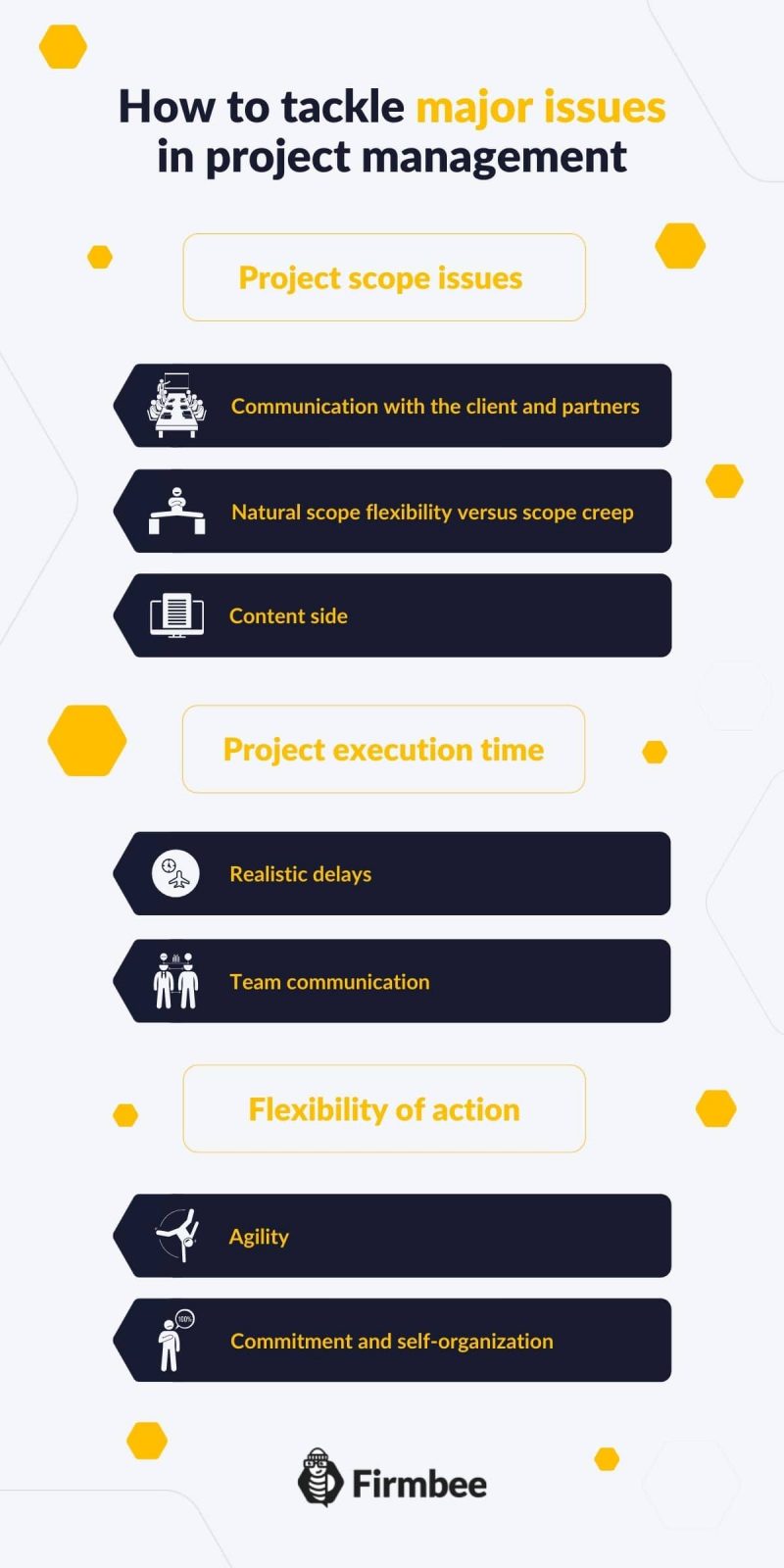The massive changes in work organization and business management initiated by the pandemic have not slowed down one bit in 2022. However, the economic ferment and dynamics may actually prove conducive to the smooth implementation of projects. Today, let’s take a closer look at the main issues in project management.
Issues in project management – table of contents:
- Main issues in project management
- Project scope issues
- Project execution time
- Flexibility of action
- Summary
Main issues in project management
According to the Pulse of the Profession report, a higher percentage of projects have been completed efficiently: achieving their goals, staying within budget and planned completion time. On the other hand, more projects were canceled in 2021 than in previous years.
Hence, we will examine the successful ones to learn from the best. What were the main issues concerning the management of these projects? And how would we try to solve them today?
We will focus today on three main areas of concern in project management. These are:
- project scope
- project execution time
- team flexibility

Project scope issues
Problems with defining the scope of the project usually start at the very outset. And even before its assumptions are fully clarified. That is why it is so crucial to carefully sketch the blueprint of the project. Don’t haste and take plenty of time to carefully clarify the aim and action plan before scheduling tasks.
It’s a good idea to use the right tools for this when planning the scope of the project as well as to divide it into epics or threads understandable to all concerned.
- Communication with the client and partners
- Natural scope flexibility versus scope creep
- Content side
To ensure the success of a project, its very birth is crucial. A favorable atmosphere, a convincing presentation of the most significant assumptions together with the negotiation and interpersonal skills of the project manager may all decide whether the project gets rejected or implemented.
The subsequent discussion with the client and other decision-makers are the binding moments that define the initial scope of the project.
But why do we talk about the “initial” scope of a project? Because its planned scope will never be identical to the final scope.
The assumption of natural flexibility of project scope is a way to deal with scope variability and simply a realistic approach. It allows the project framework to adapt to actual deliverability and changing business conditions. However, this natural variability must not apply to the key assumptions of the project.
When key assumptions change and the scope of tasks to perform expands, the success of the project is put into question. This problem is called scope creep. The term scope creep means uncontrolled project growth. And it is the bane of as much as one-third of implemented business projects.
Another hindrance in project management is defining the content of the project. A project manager must honestly answer the question: do I know enough about the tasks I want to perform?
If the answer to this question is no, then no matter how advanced the project is, it is necessary to consult with specialists. Initially with those who make up the project team. But sometimes the advice of external experts is needed.
Project execution time
Even very experienced project managers are incorrigible optimists when it comes to project execution time. This is evidenced by the statistics of completed large projects. In 2021 globally 55% of projects were completed on time. This is an increase of 4% compared to the previous year. However, the results are still not very satisfactory.
- Realistic delays
- Team communication
On-time completion of a project is usually hindered by the unrealistic time allocated for particular tasks. That is why it is worth using tools enabling statistical measurement of the actual speed of task execution and comparing it with the scheduled time.
Of course, the time of project execution is closely connected with its scope and budget. However, the decisive factors frequently turn out to be the efficiency and flexibility of the team.
Team performance has to meet clear and understandable requirements through plain delegation of tasks and responsibilities. Equally crucial is the transparency of the interdependencies of the individual stages of work execution, as well as the queuing of tasks. Taking care of these aspects of communication to prevent setbacks with project execution time.
Flexibility of action
The strait and source of failure in project management is lack of flexibility resulting from sticking to well-known, beaten paths. It frequently leads to the use of tried and tested management methods and tools unsuitable for a particular project. But how to increase your flexibility – as a project manager – and that of the whole team?
- Agility
- Commitment and self-organization
It is no coincidence that the flexibility of operation and problem-solving inherent in small, agile software design teams has gained worldwide recognition. More and more often it is the project management tools from the IT industry that spread out to other industries when the situation requires increased flexibility of operation.
Teams managed agile can exercise great flexibility. In them, managers become directly involved in the project frequently giving and receiving feedback upon their actions. And team members – at least to some extent – independently choose the tasks to perform. All that makes agile teams look similar to the model of self-organization.
Summary
We have categorized the main issues in project management into three groups. The first includes defining, understanding, and maintaining the scope of the project during its execution. The second is the timing of project tasks. The third is maintaining flexibility in team management and constantly adapting to changing conditions.
The best way to deal with these issues is to stay updated – with your schedule and knowledge, with your management methods, with your team, and with software that makes managing even very complex projects easier.
SOURCE OF STATISTICS: Pulse of the Profession 2021
Read also:Project milestones
If you like our content, join our busy bees community on Facebook and Twitter.
Author: Caroline Becker
As a Project Manager, Caroline is an expert in finding new methods to design the best workflows and optimize processes. Her organizational skills and ability to work under time pressure make her the best person to turn complicated projects into reality.


















